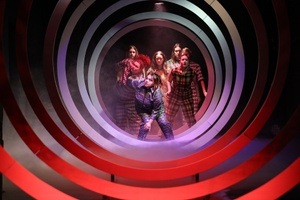In the organizer's words:
Pinocchio, also for adults!
A naughty fairy tale based on Carlo Collodi
Once upon a time ... there was a king! No, wrong! Once upon a time there was a piece of wood.
The rough piece of wood was actually meant to be a table leg. But then old Gepetto changes his mind: he carves it into a puppet that will always love him and with which he wants to earn an extra income. But things turn out differently than he expected: Pinocchio, the wooden puppet, has a loud voice, weird ideas, high-spirited stubbornness, generous compassion, plenty of curiosity and naive bravery and runs from one adventure to the next. In dicey situations, he also occasionally lies, and then his nose gets longer. Every time he narrowly escapes disaster, he thinks to himself: I want to be a good boy so badly, at any price!
How high is the price? What does he have to give up to become a "good" boy? No longer wild, trusting and warm-hearted, but well-adjusted, well-behaved and hard-working. Becoming human costs money.
We meet the wooden puppet in this classic Italian children's book at birth, he learns to talk, he learns to walk, he learns to dance, he is four, six, eight and twelve years old, until at sixteen he begins to show the wishes and needs of a pubescent. The world around him recognizes the need to "weed out" the wild traits of the daring, adventurous Pinocchio and our wooden puppet has to learn the bitter medicine of the adult world and its methods of making children "fit" for this world so that they can function smoothly within the system.
The panopticon of this moralizing education is vast: with emotional coldness, obvious humiliation, sexual taboo, ice-cold humiliation, constant control, well-intentioned blackmail, unbridled punishment, lucrative manipulation or psychological violence, the bizarre characters around Pinocchio try to pull him in the supposedly "right" direction in order to fabricate an obedient, rational subject out of him and thus bring him closer to his much longed-for humanization.
In this way, the wooden boy Pinocchio runs and stumbles from his blissful state of childlike, naïve pleasure into ever greater doubts about his own impulsive desires and makes his own sense of happiness increasingly dependent on the happiness and well-being of others, especially his "father" Gepetto.
At the end, a boy called Pinocchio looks at his now lifeless wooden body and thinks: How funny I was when I was a puppet and how happy I am now that I am a good little boy! What do we want and what price are we prepared to pay for it? How long are our noses?
Cast and crew
Text and play version: Johanna Schall and Grit van Dyk.
Director: Johanna Schall.
Stage/costumes: Heike Neugebauer.
Music: Maria Hinze.
Assistant director: Martina Lübbing.
With: Svea Auerbach, Michael Meyer, Erik Roßbander, Petra-Janina Schultz.
Technical: Torsten Ehlen, Helena Greulich, Ronja Odebrecht.
Duration: 2:30 incl. intermission
Performance language: German
This content has been machine translated.Price information:
normal: 25 € reduced: 14 € Students of the University, HS and HfK Bremen and HKS Ottersberg: Free admission













